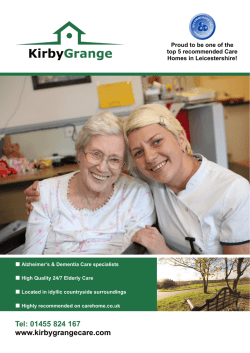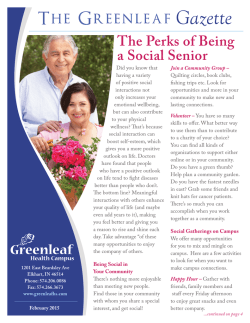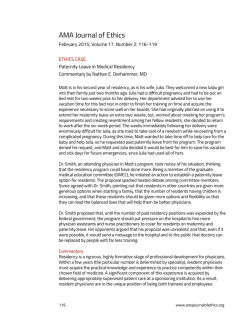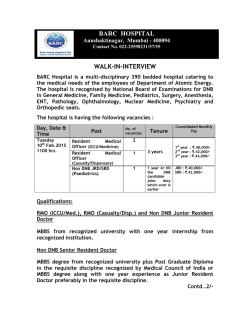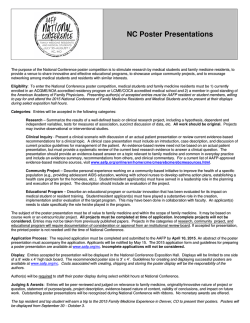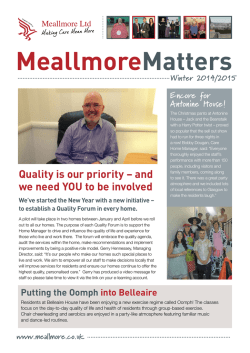
SHARING & CARING
REACHING for your goal Taking a STAND on FALLS What can PT, OT, Activities and Nursing Staff do to Reduce Falls? Melinda Jaeger, PT [email protected] Objectives 1. Explain how the Empira Falls Prevention program reduced the prevalence of resident falls between 20% and 30% in 16 long term care facilities. 2. Identify successful strategies of promoting movement and offering opportunities to reach and stand. 3. Share the journey of the Empira Falls Prevention program- specifically the collaboration of PT and OT and Therapeutic Rec (Activities Department) 4. Review approaches that can be incorporated in your facility to reduce falls. Agenda • Provide an overview of the Empira Falls Program • Share PT/OT fall assessment tools • Review the important role of Therapeutic Recreation /Activity Staff in the prevention of falls • Demonstrate how all staff can incorporate reaching and standing in daily cares to reduce falls Background & Process Empira awarded 3-year MN DHS PIPP grant, began 10/1/08 ~ A project implementing best practices from evidence based studies ~ Goal: Reduce CMS QI/QMs; Falls, Depression & Anxiety, Decline in LL ADL, Decline in movement ~ Reduction Goal: 5% first year, 15% second year, 20% third year 16 SNFs, 4 companies participate in PIPP Fall Prevent project Facility–wide Program: All departments, residents, family, MD Investigation and Interventions based on Root Cause Analysis Fall Risk Coordinator in each SNF reports to administrator who oversees the program – it’s not a nursing program! Project completion date: 10/1/11 Results after 2½ years • Prevalence of Falls (number of residents who have fallen) – decreased by 31% (QI 1.2) • Incidence of Depression – decreased 20% (QI 2.1) • Incidence Worsened ADLs – decreased 17% (QI 9.1) • Incidence Worsened Room Move – decreased 12% (QI 9.3) • Falls per 1000 resident days (number of falls that occurred) – decreased by 14% • Recurrent Falls – double digits to single digit * Compared to a baseline from July 1, 2006 to June 30, 2007 Key Components To The Empira Falls Program •All staff are responsible to reduce falls. This is NOT just a nursing program •Promote movement and increase functional mobility offering opportunities for residents to reach and stand throughout their day •Don’t do more…..do things different Physical Changes As We Age… Posture ROM Strength Reaction Time Slows Visual Changes With Aging • Acuity •Depth Perception •Contrast Sensitivity •P eripheral Visio n Somatosensory Changes • Proprioception (position sense) Ability to walk in the dark • Sensation Diabetic changes, numbness, tingling • Vestibular Works with vision to determine whether the world or we are moving. Activated in the inner ear when we move our head. Dizzy with position change. • Pain Affects all movement BALANCE •Combination of posture, ROM, strength, reaction time, visual perception somatosensory and pain “Balance Exercise Reduces Risk of Falling” Journal of the American Geriatrics Society, December 2008 Strength training alone may not effectively reduce falls since impaired balance is a stronger risk factor for falls than poor muscle strength. Walking programs did not appear to have much effect in preventing falls. The greatest effect in preventing falls were seen with exercises that challenged balance. How can YOU encourage Standing •Stand at the sink •Pause during the transfer •Allow standing for a moment Little time but BIG rewards TRANSFER POLE ENCOURAGE STANDING Fitting Balance During ADLs and Cares • Wheel chair locked Adapt if necessary with extenders, tennis balls, or auto lock if they forget to use brakes Encourage to self propel • Feet flat on floor Bed at proper height Encourage ankle strengthening by tapping feet • Change position Slowly Count to 4 stay off the floor • Encourage reaching, turning and weight shifting during cares Improves balance and flexibility Reaching and Turning in ADL’s • Turn to get toilet paper and do self hygiene • Reach for towel at sink • Turn and reach for clothing items once set up • Lift arms and lift head to assist with dressing • When offering something to resident have them reach- kleenex, snack, toothbrush, ????? • Encourage self propel wheelchair (works lots of muscles, posture, balance and independence) Ambulation Programs TALL • Stand • Keep walker close • Good shoes • Stepping: Length and height of step • Use distraction • Parkinson’s walk past destination to decrease freezing in place • Stand in place and shift weight from leg to leg •FOCUS ON STANDING AND BALANCE EVERYONE IS RESPONSIBLE TO REDUCE FALLS •ACTIVITY STAFF WERE KEY TO OFFER OPPORTUNITY TO REACH AND STAND TO REDUCE FALLS….. •Here’s how we implemented this strategy. Independent Risk Factors for Falling Among Community-Living Older Adultsa,b Tinetti, M. E. et al. JAMA 2010;303:258-266. Copyright restrictions may apply. Name ____________________________________________ Med Record# ____________ Room________________ Recommendation for Ther Rec Program *Static balance *Dynamic balance AD indoors_________ ⃞ hands free AD outdoors________ *Static Balance: front reach while upright ⃞ 1 hand support ⃞ 1 hand support I A gait *Dynamic Balance : kick, bend, ⃞ 2 hand support ⃞ 2 hand support I A curb reach overhead, retro gait ⃞ Assist by staff ⃞ Assist by staff I A stair with rail ⃞ hands free I A van/bus step ⃞ seated programming only W/C only for outing Precautions: Therapist initial ________________________________ Date______________________ The A, B, C’s AMBULATE BALANCE CHAIR Offering Opportunities to REACH Wheel chair bound can improve balance •Promote core strengthing •Improves balance •Practical in everyday activities- reach for items •Let’s try it….sit ups and balance seated Balance Challenges Easy……………..Difficult Head straight Reach Wide stance Head turned Push Pull Feet together Head lift Eyes closed Overhead Turn Tandem One leg Reaching and Turning in ADL’s • Turn to get toilet paper and do self hygiene • Reach for towel at sink • Turn and reach for clothing items once set up • Lift arms and lift head to assist with dressing • When offering something to resident have them reach- kleenex, snack, toothbrush, ????? • Encourage self propel wheelchair (works lots of muscles, posture, balance and independence) SAFETY Wheelchair brakes lock Chair sturdy with arms Table secure Using Assistive device as appropriate Wearing glasses, hearing aide Proper footwear STOP if pale, shaky, dizzy, Report any change in demeanor If in room, make sure bed is correct height Your Activity Calendar Do the Activities Promote Standing and Balance? STAND UP↑ Charades Noodlin’ (Exercising the brain and body) Have the resident stand in front of a table with a chair behind, leg rests removed. Pass out noodles, alternate colors. Say the action and have the residents act out the action with the noodles. • Hammer • Wave flag • Rolling pin • Hold the pole on the bus- • Make an X in the air • Sword fight across the table • Statue of Liberty • Shakers stand on toes, rock back on heels • One side of table put down their • Cast the fishing pole noodles, do tug of war across • Catch the fish • Steering wheel **free hand balance • Paddle the canoe • Open drawer ** free hand balance • Lawrence Welk band conductor• Close drawer ** free hand balance • Iron the clothes • Marching band director and march • Stir the soup • Twirl the baton • Helicopter Song: New York… New York Slide to middle of chair so 4” is between chair and resident, feet flat on floor. Sit TALL. Have resident pass noodle to neighbor high or low. Switch it up. Hold noodle at arm’s length. Tap feet through out: Start the music and have fun! 1. Push and Pull 2. Push Left – Center – Right while kicking alternate legs 3. Twist right hand on top – Twist left hand on top (Steering wheel) 4. Turn head and swing left – center – Turn head and swing right 5. Lift alternate knee to noodle 6. Paddle left – Paddle right 7. Kick noodle with alternate feet while switching noodle in hands 8. Tap noodle in front to left –to right while tapping feet 9. Sway noodle overhead while looking upward 10. Touch head- shoulder- knee- shin-knee-shoulder -head 11. Draw circle in air several times then draw big X several times 12. Sway side to side ……end with holding noodle out and shaking it!! When turning in the noodles have those with red noodles stand and pass theirs in. Then yellow stand and pass.... Exercise With Complex Activity •Increases neurotransmitters •Stimulates neuron growth •Strengthens and expands brain network Challenging Leisure Activities •Dancing, of all kinds, is the most effective activity as far as decreasing risk of dementia and cognitive decline. •Playing board games and musical instruments, doing word puzzles and reading also decrease your risk. (Cohen, 2005) Meaningful Activities Personally Relevant/Important, Contribute to Wellbeing • Brings back good memories • Relaxing • Enjoyable • Makes you laugh • Makes you feel healthy • Makes you feel good about yourself • Let you try something new or get better at something • Helps you express your feelings, • Validates life experiences Diagnosis Specific Strategies Parkinson’s - direct past destination, count or encourage long steps to ↓ shuffle, work on posture MS - don’t overtire, heat intolerant Arthritis - encourage ROM, awareness of flare ups, avoid heavy weights Osteoporosis – avoid flexion and weights Macular Degeneration – avoid bright light, poor central vision, poor contrast, ↓ face recognition Dementia – ↓ distractions, use calm, reassuring manner, familiar activities •A personal invitation and the support of family and friends will encourage older adults to take part in fall prevention programs. Stepping It Up • Golf Putting • Bean Bag Toss • Bowling • Wii • Ball Toss • Dance to Music • Cooking • Art • Walk Through Europe or Walk to Hutchinson • Massage • Tai Chi Community Involvement • Quilting • Card Club • Book Club • Gardeners Club • Art Class • Tai Chi – Chair Yoga • Support Group: Grief/Loss, Parkinson’s Stroke, Diabetes, MS Bright Light promotes the secretion of Serotonin • Serotonin is the “happy, feel good” biochemical. • It regulates mood and provides a sense of well-being and happiness. • It also helps to regulate appetite, wakefulness, sleep, and the cognitive functions of memory and learning. • Serotonin is also a growth factor for some cells, which gives it a role in healing, especially wound and skin healing. • Serotonin is triggered by the presence of bright light. More light = more serotonin produced Less light = less serotonin produced. LIGHT METER TO MEASURE LIGHT $33 on Amazon 500- 1000 lux for 120 min (Indoors) 10000 lux for 30 minutes (Out Doors) Happy Light …It outputs up to 2500 lux (150 watts) of Natural Spectrum® daylight from a cool burning 26 watt bulb. Measures 9" H x 4 3/4" W x 2 1/4" D. UL listed. $39.00 OR.. Open the blinds and let the sun in!! NO BENDING •Use reacher •Use long handle shoe horn •Use elastic shoe laces or easy shoes to put on •Keep room accessible so resident does not bend •Keep items out of low drawers •Keep floor clean Incorrect FootwearSlippers… Gripper socks a real hazard on carpet! Lets try it out Shoe Brochure On Admission Falls Trending Report • What is it • What does it mean to TR 5-5:59 4-4:59 3-3:59 2-2:59 1-1:59 12-12:59AM 11-11:59 10-10:59 9-9:59 8-8:59 7-7:59 6-6:59 5-5:59 4-4:59 3-3:59 2-2:59 1-1:59 12-12:59PM 11-11:59 10-10:59 9-9:59 8-8:59 7-7:59 # of 6-6:59AM August 2012 Falls In One of Our NH 6 5 falls 4 3 2 1 0 Time of day R- August 2012 Fall Summary Critical times to provide activities 1-3 p.m. • Routine time for naps- Naps rob the sleep bank Nap NIGHT SLEEP How long does it take to put a resident down for a nap?..The NAR can use this time instead to engage the resident. Activity staff can focus on activities during traditional nap times to reduce boredom. Purpose: To provide active, purposeful engagement for residents to reduce boredom(apathy), napping and pharmacological treatment for behaviors which disrupts sleep. Focus on the Dementia resident who is unable to initiate self driven activities. CMS NATIONAL GOAL REDUCE ANTIPSYCHOTICS BY 15% • Nursing Homes antipsychotic drug use is available on Nursing Home Compare • Antipsychotics increase fall risk in elders • CMS is emphasizing non-pharmacological alternatives for nursing home residents including: consistent staff assignments, increased exercise of time outdoors, monitoring and managing pain and planning individualized activities. Activity Improves Sleep and Decreases Agitation • 1 nursing home 29 residents over 14 weeks • Sleep efficiency improved from baseline of 51.7% to 62.5% (17% improvement) • Control group Sleep efficiency was 66.3 at baseline, after 14 weeks 67% (no change) • 7 of 15 residents who had activities during 14 weeks had decrease in observed agitation • Control group only 1 of 14 had decrease in observed agitation. Alessi CA, Yoon EJ, Schnell J et al. A randomized trail of a combined physical activity and environment al intervention in nursing home residents: do sleep and agitation improve” J am Geriatr Soc 1999 47:784-91 ACTIVE ENGAGEMENT • Pulls participants out of a passive state, expending energy, providing pleasure and movement opportunities, and reducing other neuropsychiatric symptoms” (Buettner, Fitzsimmons & Dudley, 2010) Need to reduce apathy to reduce agitation INTEREST BOX IDEAS • Fishing Box • Jewelry Box • Recipe Card/Spices • Sales Receipt Box • Envelope and Stamp • Scratch and Sniff Sticker • Playing Card Box, dominoes • Sports/Gardening • Key and Lock • PVC pipe fitting •Your Ideas Share Activity Ideas – What can I implement tomorrow???? •What should go in the activity bin for NARs to engage the resident during traditional nap hours? Simple, easy set up, cross cultural and gender •What will TR Dept provide during nap hours? Engaged (busy) Residents •Sleep better •Have less falls •Have less depression •Have less behaviors August 2012 Falls In One of Our NH 6 5 # of falls 4 3 2 1 0 Time of day R- August 2012 Fall Summary Critical times to provide activities 6- 8 p.m. • Delay the bed time for residents so they do not awaken at 2-3 a.m.- promotes restorative sleep • Utilize managerial staff talents to “entertain” engage the residents. Great opportunity for management and non clinical staff. Wonderful modeling for NARs. How can we all participate in engaging the residents? • Nonclinical staff- housekeeping , maintenance, business office, • Managers • SW, Chaplains • TR • NAR • Nurses, LPN, TMA • Families • Volunteers volunteermatch.org • Other Residents What did you see? Resident is leading this activity SHARING & CARING PIPP RSVP Project Facility Managers Share their Talents to Improve Care of our Dementia Residents Providing Meaningful Engagement WIFM- What’s in it for me? • One flex day per month to come in later and work through 7 p.m. Morning free to schedule appointments. • The rewards of sharing your talents, skills with the residents of your facility. An opportunity to build relationships. • Budget neutral- doesn’t cost the facility $ but provides programming for the resident. • Gives management an opportunity to review evening shift practices and systems. • Great visibility to the NAR and front line staff. They feel supported in their role of caring for the resident. • Meets CMS directive to provide non-pharmacological alternatives for dementia Nursing Home residents. WHAT WILL I DO? • 6-7 pm will fill the void after dinner and before bed. The residents need an activity • Share your talent • Musical- piano, harmonica, sing, guitar • Read poems, discuss POSITIVE events in the newspaper, use the resource bin with books on elder nostalgia, trivia • Talk about a recent trip, your garden, your recent smart phone apps, bring in props for residents to see and touch • Use magazines to create collage, draw together • Play dominoes, shake dice, shuffle and sort cards • Use the resource bin on the unit which has hand lotion for hand massages, horseshoes and bean bag toss for physical games, lots of activities provided for you • Also have the 101 activities resource for ideas in this folder 101 Things to do with a person with Alzheimer's . and Dementia Disease Provide existence with meaning. Make each activity success oriented, failure free, purposeful and meaningful 1. Make collage from magazine 2. Put together nuts and bolts 3. Bake cookies 4. Read paper 5. Invite children to visit 6. Read a letter out loud 7. Listen to music 8. Parachute game 9. Color/Paint 10. Make lemonade 11. Wipe off table 12. Talk about gardening 13. Make Pigs-in-a-Blanket 14. Spelling bee 15. Readers Digest 16. Fold clothes, sort socks 17. Pet visit 18. Cut out cards 19. Wash silverware 20. Bake bread 21. Sort objects 22. Sing Christmas songs 23. Life Review 24. Put silver away 25. Make a Valentine's collage 26. Sing songs 27. Look out window, what do you see? 28. Make a pie 29. Read a poem 30. Dye Easter eggs 31. Sort socks 32. Take a walk 33. String fruit loops 34. String cranberries 35. SNOEZELEN ® 36. Look at photos 37. Reminisce 38. Clip coupons 39. Sort poker chips 40. Count things 41. Fold towels 42. Afternoon Tea 43. Reminisce/Inventions 44. Play a game 45. Paint 46. Cut out paper dolls 47. Identify states and capitols 48. Make a family tree 49. Color American Flag 50. Cook hot dogs 51. Grow magic rocks 52. Water house plants 53. Reminisce - first kiss 54. Play horseshoes 55. Dance 56. Sing a hymn 57. Make ice cream 58. Plant bulbs 59. Make cards 60. Sort cards by suit 61. Write a letter 62. Dress in team colors-talk sports 63. Pop popcorn 64. Name the U.S. Presidents 65. Give a manicure, hand massage with scented lotion 66. Music, Movement & Props 67. Plant or weed 68. Make a may basket 70. Finish a famous saying 71. Feed the ducks 72. Mold dough 73. Picture books 74. Put a simple puzzle together 75. Sand wood 76. Rub on hand lotion 77. Decorate place mats 78. Arrange fresh flowers in a vase 79. Remember famous people 80. Rake leaves 81. Make a fruit salad 82. Sweep the patio or room 83. Talk about famous events 84. Nursery Rhymes. You start 85. Make sandwiches 86. Dust furniture 87. Cut up paper/ Tear paper 88. Take care of bird cage/fish tank. 89. Trace/cut leaves 90. Simple trivia questions 91. Finish Bible quotes 92. Paint with string 93. Cut out pictures 94. Read/listen to a short story 95. Put coins in a jar 96. Sew sewing cards 97. Put seed in bird feeder 98. Clean out pumpkin 99. Roll yarn 100. Reminisce about vacation 101. Make a cake Exercise and Brain Health • Inactivity kills our brains-physically shrinking them. • If your brain isn’t actively growing, then it is dying. • Toxic levels of stress and chronic depression erode the connections between billions of nerve cells and shrinks certain areas of the brain. • Exercise has a profound impact on cognitive abilities and mental health. • Because the aging brain is more vulnerable to damage, anything you do to strengthen it has a more pronounced effect than it would on a young adult. • Exercise is preventive medicine as well as an antidote. Good Strategies to Reduce Falls • Keep awake with bright light, in front of windows or outdoors. Residents are bored….not sleepy! • Keep it simple, no distractions (clutter free, quiet) • Make eye contact and use body language that is positive (I want to be here, I have time, you are important) •Follow Human Biological Clock • Stimulate the senses- Smell, Visual, Touch, Proprioceptive, Vestibular, Auditory (sound) and Taste Human Biological Clock: Ideal 24 Hours (3:30 PM) Serotonin secretion starts (6:00 PM) 20:00 Serotonin (8:00PM) Lowest blood pressure Greatest healing and growth occurs secretion stops Aromatherapy • Aroma targets different neuro-chemicals in the brain Aromatherapy • Certain studies involving brain wave frequency indicated that smelling lavender increases alpha waves in the back of the head which calm and reduce falls J Am Geriatr Soc. 2012 Jun;60(6):1005-11. doi: 10.1111/j.1532-5415.2012.03977.x. Epub 2012 May 30. Fall prevention using olfactory stimulation with lavender odor in elderly nursing home residents: a randomized controlled trial. Sakamoto Y1, Ebihara S, Ebihara T, Tomita N, Toba K, Freeman S, Arai H, Kohzuki M • The fragrance of jasmine and citrus increases beta waves in the front of the head, which are associated with a more alert state. • Peppermint applied topically causes nerves to be less stimulated and pain relieved PUTTING IT ALL TOGETHER EVIDENCE BASED PROGRAM • “Balance Training Program is Highly Effective in Improving Functional Status and Reducing the Risk of Falls in Elderly Women with Osteoporosis.” MM. Madureira, PhD., et al., Osteoporosis International, Vol. 18, pp. 419 – 425, 2007. • “Effective Exercise for the Prevention of Falls in Older People: A Systematic Review and Meta-Analysis.” Catherine Sherrington, PhD., et al., Journal of American Geriatric Society, Vol. 56, pp. 2234 – 2243, 2008. • “Not Preventing Falls – Promoting Function,” Elizabeth Capezuti, RN, PhD, et al., Geriatric Nursing, Vol. 32, No. 1, p. 55 - 57. January/February 2011. We all have a role in managing falls •No alarms, •Standing, Reaching, Balance! •Bright light during the day to promote wakefulness. •NO naps. Provide engagement at key times •What will you do to prevent falls when you get back to your facility? Workshop Wrap Up 1. 2. 3. 4. 5. 6. 214 Bed Home Average Quarterly Falls per 1000 Resident Days 8 7.5 7.9 7 6.5 7 7 6.8 6 6.6 6.2 5.5 6.1 5.9 5.9 6 6 5.7 5 5.6 5.5 5.4 5.2 4.5 5.1 4.9 5.1 5.1 5 4 Q4 Q1 Q2 Q3 Q4 Q1 Q2 Q3 Q4 Q1 Q2 Q3 Q4 Q1 Q2 Q3 Q4 Q1 Q2 Q3 Q4 '08 '09 '09 '09 '09 '10 '10 '10 '10 '11 '11 '11 '11 '12 '12 '12 '12 '13 '13 '13 '13
© Copyright 2026
